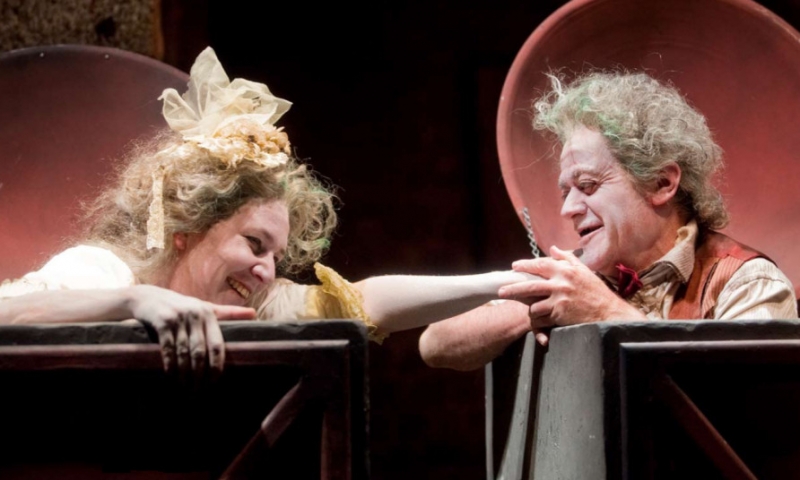
“Nothing is funnier than unhappiness,” says Nell in Samuel Beckett’s Endgame, and the current production directed by Nola Chilton at the Khan Theatre proves her right. Four dysfunctional people waiting out the end of their time in a single room may not sound like much fun, but Chilton’s understated yet precise approach to Beckett’s biting humor and deep sense of all that makes us human, and the excellent ensemble cast present a create a poetic, playful and yet painful rumination on family life and relationships.
The magic of the Khan – and Miriam Guretzki’s set design with Roni Cohen’s lighting, transforms the space once more. A sheet-draped chair is lit with a single spotlight, surrounded by darkness as if it is suspended in space. When the stage lights come on, the familiar stone pillars become part of the underground chamber with two high, barred windows that play a role this dark comedy where a strange family goes about the rituals of their daily life: The blind Hamm who cannot stand up, his son/servant Clove, who cannot sit and Hamm’s aging parents Nag and Nell, who live in rubbish bins at the side of the stage.
Beckett is a Shakespeare for the post-nuclear age. Where the latter is abundant in his use of words and imagery, Beckett writes from a place of loss and scarcity, yet each word and phrase create reverberates with associations. Beckett’s writing is a poetics of minimalism with a cadence and sensibility that loses none of its force and relevance with the passage of time.
Yael Renan’s translation is beautifully transparent, it feels like contemporary Hebrew yet for the most part avoids specific phrases and slang that might tie the play too closely to a particular time and local – preserving Beckett’s universe of discontinuity. When she does pull out a proverb it packs a punch. As Clove shuts the rubbish bin lid on Nag (ordered by Hamm to “bottle him”) he says in Hebrew, “show deference to your old” – the phrase from Leviticus 19:32 standing in sharp contrast to his actions.
Any production of a classic play presents a temptation to the director to do something daring and different. In this case, Chilton is to be applauded for presenting this classic in a direct manner that reveals her strong connection to the text and allows its presence to emerge.
Performing Beckett in Israel brings Israeli playwright Hanoch Levin (1943 – 1999) to mind, the influence and affinity is ever-present, and an understanding and enjoyment of Levin can be enhanced through encountering his predecessor. Delighting and sparing in words, both write from an intimate acquaintance with literature that is expressed in their work in coded allusions that might easily escape the roving eye. In this minimalist landscape, every word, every name is a potential path to explore. The two main protagonists, Hamm and Clove, are no exception.
While not a kosher connection, Hamm and Clove clearly belong together in the culinary scheme of things. Hamm may refer to Noah’s son, (Genesis 9:20 – 25), who came upon the sleeping, drunk figure of his father, “saw his nakedness”, and was subsequently cursed by Noah – much room for speculation here as commentary on the relationship between Hamm and Nag. Clove, in addition to a fragrant spice, evokes the thought of cloven hoofs – reminiscent of the devil. Last but not least, is the sense of Hamm as a “ham actor” in this very self-aware and self-reflective play, which is as much a reflection on theatre as it is on life itself, and the relationship between the two.
The relationship between Hamm and Clove is as poignant as it is abusive. Arie Tcherner as Hamm is monolithic in his infirmity, the blind ruler of this claustrophobic realm. Nir Ron whistles while he works, comically cheerful as he serves Hamm in a minimalist manner. Although they lost their legs long ago, and are confined to rubbish bins, Yehoyahin Friedlander and Irit Pashtan shine as Nag and Nell, imbuing their poignantly funny performance with a flirtatious sexuality and warmth.
Endgame is part of the Khan Theatre’s current repertoire. Upcoming performances will take place on October 12 & 13 at 20:30 at the Khan Theatre, 2 David Remez Street, Jerusalem. Shai Shabtai of Tel Aviv University will present a free talk on “Beckett’s Minimalist Theatre” before each performance (beginning at 19:30) – so plan to arrive early! Tickets: 02- 6303600.
AYELET DEKEL





